ASCO结肠癌进展
ASCO 2013-CRC进展-王雅杰
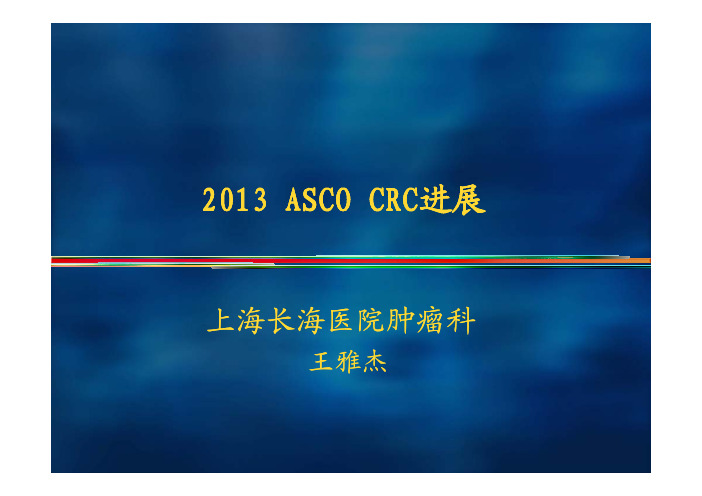
2013 ASCO CRC进展2013ASCO CRC进展上海长海医院肿瘤科王雅杰CRC 药物治疗进展2012ESMO指南:早期结肠癌的辅助治疗分期TNM临床风险年龄(岁)+/-FUT3/4低/FU高:•<12个淋巴结L+V+PN+<70FUFU+Oxap(I,A)II T3/4,N0•L+, V+, PN+•>G2,•pT4•梗阻, 穿孔>70FUFU+O(生理年龄年轻者III D •当>G2作为唯一高危因素时,需查SMIFU +Oxap,(生理年龄年轻者,III,D)FU +Oxap(I,A)III N+<70Folfox/Xelox好于Flox(I,A) >70FUFU+Oxap(生理年龄年轻者)FU +Oxap,(生理年龄年轻者)MOSAIC 研究N0 16968 RFS 亚组分析N016968RFSFOLFIRI+西妥昔单抗vs. FOLFIRI+贝伐单抗一线治昔单抗疗KRAS野生型转移性结直肠癌的随机对照研究mCRC 一线治疗1FOLFIRI +西妥昔单抗西妥昔单抗:400 mg/m 2iv 120分钟起始剂量250 mg/m 2 iv 120分钟每周1次德国AIO 研究KRK-0306(FIRE-3)线治疗KRAS野生型N=592随机1:1FOLFIRI +贝伐单抗贝伐单抗:5 mg/kg iv 30-90分钟每2周1次主要入组标准–– 主要终点:ORR – 2008年10月修正方案研究设计FOLFIRI+爱必 妥(62%)与FOLFIRI+贝伐单抗(50%)相比, ORR差异为12%患者基线资料患者基线资料治疗持续时间ORR评估缓解率评估RECIST,n(%) 完全缓解 部分缓解 部分缓 疾病稳定 疾病进展 未评估 FOLFIRI + 西妥昔单抗 N=297 13(4.4) * ( ) 171(57.6) 53(17.5) * 21(7 1) 21(7.1) 39(13.1) FOLFIRI + 贝伐单抗 N=295 4(1.4)* 167(56.6) ( ) 85(28.8)* 16(5 4) 16(5.4) 23(7.8)* 缓解有显著差异;P值为双侧Fisher精确检验 缓解 著 异; 值为双 确检无进展生存期1.0事件 n/N(%)0 75 0.75 Probability o P of survival中位(月) 10.0 10.395%CI 8.8 - 10.8 9.8 - 11.3FOLFIRI + 西妥昔单抗 FOLFIRI + 贝伐单抗0.50250/297 (84 2%) (84.2%) 242/295 (82.0%)HR 1.06(95% 1 06(95% CI 0 0.88 88-1 1.26) 26) Log-rank p=0.5470.250.0 12 number 297 295 s at risk 100 99 48 36 24 months since start of treatment 19 15 10 6 5 4 60 3 72Sebastian Stintzing, MD at 2013 ASCO总生存期1.0事件 n/N(%)中位(月) 28.7 25.095%CI 24.0 - 36.6 22.7 - 27.60 75 0.75 Probability o P of survivalFOLFIRI + 西妥昔单抗 FOLFIRI + 贝伐单抗158/297 (53.2%) 185/295 (62.7%)0.50( CI 0.62-0.96) ) HR 0.77(95% Log-rank p=0.0170.250.0 12 number 297 295 s at risk 218 214 48 36 24 months since start of treatment 111 111 60 47 29 18 60 9 2 72Sebastian Stintzing, MD at 2013 ASCO后续抗肿瘤治疗FOLFIRI + 西妥昔单抗 N=297 任何二线治疗,% 贝伐单抗 二线治疗,% 抗EGFR 二线治疗,% 65.7 48.2 14.4 FOLFIRI + 贝伐单抗 N=295 61.7 17.6 42.9 P值 0.347P值为双侧Fisher精确检验OS探索性亚组分析HR (95% CI) 性别: 男 女 ≤ 65 > 65 结肠 直肠 1 >1 否 是 是 否 < 8/nl ≥ 8/nl0.1 10.73 (0.56 – 0.94) 0.88 (0.61 – 1.29) 0.75 (0.56 – 1.01) 0.80 (0.58 – 1.09) 0.88 (0.67 – 1.16) 0.62 (0.43 – 0.89) 0.78 (0.56 – 1.09) 0.77 (0.58 – 1.02) 0.79 (0.61 – 1.02) 0.74 (0.50 – 1.10) 0.75 (0.59 – 0.97) 0 83 (0 0.83 (0.54 54 – 1.25) 1 25) 0.68 (0.51 – 0.90) 0.92 (0.66 – 1.28)年龄: 部位:转移部位的数目:仅有肝转移: 同步转移: 白细胞:支持: FOLFIRI+西妥昔单抗FOLFIRI+贝伐单抗10血液学毒性FOLFIRI + 西妥昔单抗 N=297 % 白细胞减少 贫血 血小板减少 中性粒细胞减少 发热性中性粒细 胞减少P值为Fisher精确检验FOLFIRI + 贝伐单抗 N=295 任何级别 66.8 90.9 23.4 60.3 3.0 ≥ 3级 11.2 1.4 0.3 22.8 1.0任何级别 66.7 87.9 25.6 61.3 1.7≥ 3级 12.8 2.4 0.3 24.2 1.7P值 ≥ 3级 0.613 0.545 >0.999 0.699 0.725非血液学毒性FOLFIRI + 西妥昔单抗 N=297 毒性, % 发生任何事件的患者 恶心 呕吐 腹泻 粘膜炎/口腔炎 疲乏 疼痛 手足综合症 致命性不良事件 任何级别 100.0 48.2* 24 6** 24.6** 57.2 42.1 50.2 50.2 26.6*** na ≥ 3级 71.0 3.4 24 2.4 11.5 3.7 0.7 5.4 3.4 0.0 FOLFIRI + 贝伐单抗 N=295 任何级别 100.0 62.4* 32 9** 32.9** 62.7 44.8 54.9 58.0 14.2*** na ≥ 3级 63.7 4.8 34 3.4 13.6 4.1 1.4 7.1 0.7 1.7 P值 ≥ 3级 0.066 0.414 0 473 0.473 0.458 0.835 0.449 0.401 0.037 0.030任何级别的毒性有显著差异 * 0 0005 **p=0.03; 任何级别的毒性有显著差异:*p=0.0005; ** 0 03 ***p=0.0002; *** 0 0002 P值为Fisher精确检验 P值为Fi h 精确检验西妥昔单抗相关的特殊不良事件FOLFIRI + 西妥昔单抗 N=297 毒性, % 痤疮样皮疹 脱屑 甲沟炎 输液相关过敏反应 低钙血症 低镁血症 任何级别 77.4* 35.4* 37.4* 7 7* 7.7* 27.6** 63 3* 63.3* ≥ 3级 16.8 6.7 5.7 40 4.0 4.0 44 4.4 FOLFIRI + 贝伐单抗 N=295 任何级别 7.8* 11.5* 9.2* 0 0* 0.0* 15.3** 39 7* 39.7* ≥ 3级 0.0 0.7 0.0 00 0.0 2.4 07 0.7 <0.0001 0.0001 <0.0001 0 0004 0.0004 0.351 0 007 0.007 P值 ≥ 3级任何级别的毒性有显著差异:*p<0.0001; **p=0.0003; P值为Fisher精确检验贝伐单抗相关的特殊不良事件FOLFIRI + 西妥昔单抗 N=297 毒性 % 毒性, 高血压 蛋白尿 出血 脓肿/瘘管 胃肠道穿孔 血栓形成(任何) 血栓栓塞事件 伤口愈合并发症 任何级别 21.2* 2.7 21.2** 1.4# 0.3 9.4 74 7.4 2.0 ≥ 3级 6.4 0 0.7 0.3 0.3 6.1 51 5.1 0.3 FOLFIRI + 贝伐单抗 N=295 任何级别 38.3* 2.0 28.5** 5.4# 0.7 11.5 71 7.1 2.7 ≥ 3级 6.8 0.3 0.3 1.0 0.7 6.1 58 5.8 1.4 P值 ≥ 3级 0.870 0.498 >0.999 0.372 0.623 >0.999 0 720 0.720 0.216任何级别的毒性有显著差异 * 任何级别的毒性有显著差异:*p<0.001; 0 001 **p=0.046; ** 0 046 #p=0.006 0 006 ; P值为Fisher精确检验 P值为Fi h 精确检验贝伐单抗相关的特殊不良事件FOLFIRI + 西妥昔单抗 N=297 毒性 % 毒性, 高血压 蛋白尿 出血 脓肿/瘘管 胃肠道穿孔 血栓形成(任何) 血栓栓塞事件 伤口愈合并发症 任何级别 21.2* 2.7 21.2** 1.4# 0.3 9.4 74 7.4 2.0 ≥ 3级 6.4 0 0.7 0.3 0.3 6.1 51 5.1 0.3 FOLFIRI + 贝伐单抗 N=295 任何级别 38.3* 2.0 28.5** 5.4# 0.7 11.5 71 7.1 2.7 ≥ 3级 6.8 0.3 0.3 1.0 0.7 6.1 58 5.8 1.4 P值 ≥ 3级 0.870 0.498 >0.999 0.372 0.623 >0.999 0 720 0.720 0.216任何级别的毒性有显著差异:*p<0 001; **p=0.046; 任何级别的毒性有显著差异:*p<0.001; **p 0 046;#p=0.006 p 0 006 ; P值为Fisher精确检验疗效总结ITT人群ORR可进行有效率评估的患者显著提高ORR显著提高ORRPFS显著延长)(,pOS (HR 0.77, p=0.017)FOLFIRI+西妥昔单抗vs. FOLFIRI+贝伐单抗一线治疗KRAS野生型转移性结直肠癌的随机对照研究2005年开始入组CALGB/SWOG ﹟80405 CALGB/SWOG2014年报告最终结果TRIBE研究GONO协作组III期研究主要终点:PFSTRIBE研究GONO协作组III期研究TRIBE:患者基线资料TRIBE:患者接受治疗资料TRIBE:安全性资料TRIBE:安全性资料TRIBE:主要终点PFSTRIBE :PFS 与生物标记物TRIBE:次要终点ORRTRIBE:次要终点OSCAIRO3III CAIRO3 III 期研究:维持治疗CAIRO3III期研究方案设计CAIRO3 III期研究:方案设计CAIRO3:患者基线资料CAIRO3 III期研究:方案设计CAIRO3IIICAIRO3 III期研究:结果CAIRO3IIICAIRO3 III期研究:结果CAIRO3IIICAIRO3 III期研究:结果CAIRO3IIICAIRO3 III期研究:结果CAIRO3IIICAIRO系列研究:CAIRO1CAIRO-1CAIRO系列研究:CAIRO2CAIRO-2CAIRO-4CAIRO 系列研究:CAIRO 4Newly diagnosed,experimental arm :Resection of the primary tumour asymptomatic synchronous unresectable mCRC primary tumour followed by systemictherapy1:1Randomized Phase III StudyR•CAIRO4(NCT01606098)control arm :systemic therapy aloneB-raf V600突变抑制剂Dabrafenib治疗突变Dabrafenib+Trametinib Braf mCRCB-raf突变CRC:BRF113220研究BRF113220研究:安全性BRF113220研究:有效性2+2+Ca/Mg合剂对Oxap神经毒性预防研究–钙镁合剂组对照组P 因III度神经毒性而中止治疗0%12%P =0.0016因神经毒性退出治疗4%31%P=0.000003 III度神经毒性8%20%P =0.003P=0.003。
ASCO胃肠道会议进展张俊
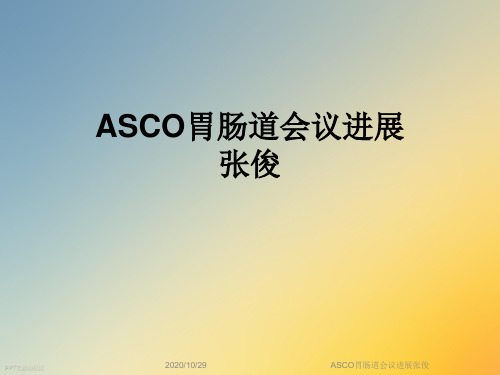
•FOLFOX4
•观察
•随访
•FOLFOX4+ 贝伐单抗
•Bev 5mg/kg q2w
•贝伐单抗单药
•Bev 7.5mg/kg q3w
•XELOX+ •贝伐单抗
•Bev 7.5mg/kg q3w
•贝伐单抗单药
•Bev 7.5mg/kg q3w
•随访 •随访
•24周
•24周
•De GramoAnStCAO,胃et肠a道l. 2会0议11进A展SC张O俊GI Abstract 362.
vs. XELOX + bevacizumab (if co-primary endpoints met)
PPT文档演模板
ASCO胃肠道会议进展张俊
DFS (ITT Stage III) Data cut-off date: 30 June 2010 (3-year minimum follow-up)
223 (23) 47 (5) 21 (2) 30 (3) 62 (7) 57 (6) 64 (7)
177 (19) 46 (5)
•*And
PPT文档演模板
without
evidence
of
disease
at
randomization;
percentages
bAaSsCeOd胃o肠n道N会议进展张俊
ASCO胃肠道会议进展 张俊
PPT文档演模板
2020/10/29
ASCO胃肠道会议进展张俊
Highlights of 2011 ASCO GI 结直肠癌
辅助化疗
• Abstract # 362:AVANT (XELOX+BVZ VS FOLFOX+BVZ VS
结直肠癌伴肝脏转移的治疗进展
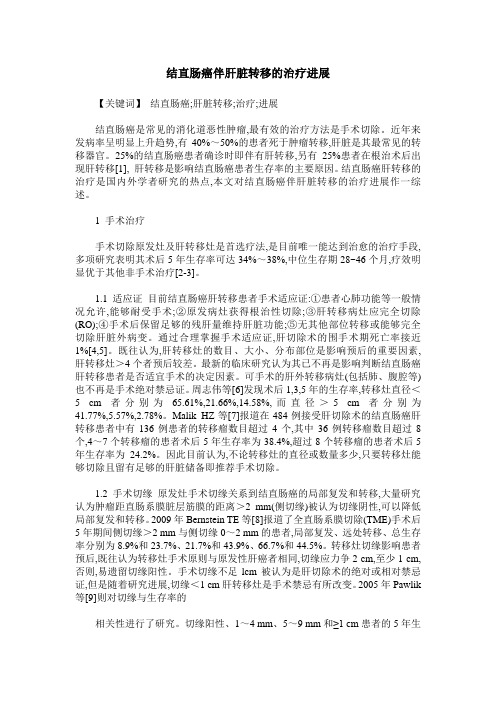
结直肠癌伴肝脏转移的治疗进展【关键词】结直肠癌;肝脏转移;治疗;进展结直肠癌是常见的消化道恶性肿瘤,最有效的治疗方法是手术切除。
近年来发病率呈明显上升趋势,有40%~50%的患者死于肿瘤转移,肝脏是其最常见的转移器官。
25%的结直肠癌患者确诊时即伴有肝转移,另有25%患者在根治术后出现肝转移[1], 肝转移是影响结直肠癌患者生存率的主要原因。
结直肠癌肝转移的治疗是国内外学者研究的热点,本文对结直肠癌伴肝脏转移的治疗进展作一综述。
1 手术治疗手术切除原发灶及肝转移灶是首选疗法,是目前唯一能达到治愈的治疗手段,多项研究表明其术后5年生存率可达34%~38%,中位生存期28~46个月,疗效明显优于其他非手术治疗[2-3]。
1.1 适应证目前结直肠癌肝转移患者手术适应证:①患者心肺功能等一般情况允许,能够耐受手术;②原发病灶获得根治性切除;③肝转移病灶应完全切除(RO);④手术后保留足够的残肝量维持肝脏功能;⑤无其他部位转移或能够完全切除肝脏外病变。
通过合理掌握手术适应证,肝切除术的围手术期死亡率接近1%[4,5]。
既往认为,肝转移灶的数目、大小、分布部位是影响预后的重要因素,肝转移灶>4个者预后较差。
最新的临床研究认为其已不再是影响判断结直肠癌肝转移患者是否适宜手术的决定因素。
可手术的肝外转移病灶(包括肺、腹腔等)也不再是手术绝对禁忌证。
周志伟等[6]发现术后1,3,5年的生存率,转移灶直径<5 cm者分别为65.61%,21.66%,14.58%,而直径>5 cm者分别为41.77%,5.57%,2.78%。
Malik HZ等[7]报道在484例接受肝切除术的结直肠癌肝转移患者中有136例患者的转移瘤数目超过4个,其中36例转移瘤数目超过8个,4~7个转移瘤的患者术后5年生存率为38.4%,超过8个转移瘤的患者术后5年生存率为24.2%。
因此目前认为,不论转移灶的直径或数量多少,只要转移灶能够切除且留有足够的肝脏储备即推荐手术切除。
结直肠癌的新辅助化疗概述

结直肠癌的新辅助化疗概述结直肠癌是常见的消化道恶性肿瘤之一,近年来其发病率逐年上升,手术治疗是其首选治疗方案,但多数病例就诊时已为进展期肿瘤。
因此20世纪80年代以来,术前新辅助化疗逐渐应用于临床,并表现出较好的疗效,加之新的化疗药物及分子靶向药物的应用,大大改善了结直肠癌患者的预后,为结直肠癌的治疗做出了重要贡献。
本文就结直肠癌新辅助化疗的研究进展做以综述。
标签:结直肠癌;新辅助化疗结直肠癌是常见的恶性肿瘤之一,其发病率已跃居常见肿瘤第3位,全球每年新发病例近1 20万,死亡人数达60万[1,2]。
据报道,有25%的结直肠癌患者就诊时已为中晚期,超过25%的患者第一次根治术后将复发或转移。
尽管近年来结直肠癌的治疗得到长足发展,但是IIIC期及Ⅳ期结直肠癌患者的5年生存率仍不超过50%,Ⅳ期更是低于10%[3]。
新辅助化疗(Neoadjuvant chemotherapy)是指对结直肠癌患者在手术之前给予全身化疗,已作为结直肠癌的主要治疗手段之一。
1989年,Wilke[4]等报道了新辅助化疗在进展期胃癌患者中的应用。
随着大规模的研究和临床应用,目前新辅助化疗已应用于多种肿瘤,并取得肯定疗效,成为综合治疗重要的组成部分。
1新辅助化疗的概念新辅助治疗(neoadjuvant therapy)是指针对局部晚期的结直肠癌患者或伴同时性肝转移的患者术前采用的治疗方法,包括新辅助化疗(neoadjuvant chemotherapy,NC)、新辅助放疗(neoadjuvant radiotherapy)和新辅助放化疗(neoadjuvant chemoradiotherapy)。
NC是其中最常用的一种,可以不同程度地减轻肿瘤负荷,降低肿瘤临床分期。
因此,近年来NC在结直肠癌中的应用已受到越来越多的重视。
2新辅助化疗的可行性新辅助化疗的作用原理:①减低肿瘤负荷,降低肿瘤分期,使不能切除的肿瘤变为可以切除,提高治愈性、手术切除率[5];②控制微小及潜在的转移灶,减少术中播散及术后转移复发,清除肝内的微小转移灶[6];③防止术后肿瘤血供改变以致影响化疗效果,效果优于术后;④可使手术时肿瘤细胞增殖能力处于最低状态,减少术中癌细胞医源性播散;⑤在化疗敏感性试验中,有助于了解肿瘤对化疗药物的敏感性,有利于术后化疗药物的选择,以指导制定术后治疗计划,并可协助判断预后[7];⑥对于伴有肝转移的患者,使不可切除的患者变为可切除,并且减少肝脏的切除范围,最大限度的保留肝体积[8]。
中国临床肿瘤学会 (CSCO)结直肠癌诊疗指南2020版
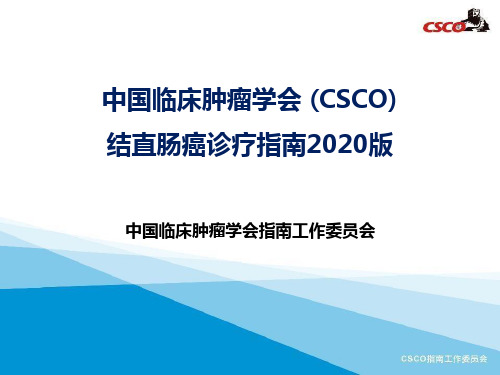
≥1位一级或二级 亲属患大肠癌
Lynch HT, et al. 2013
遗传性结直肠癌指南总体框架
遗传性结直肠癌主要包括:
• Lynch综合症 • FAP (家族性腺瘤性息肉病)
典型的FAP
结直肠内息肉数均在100枚以上,癌变 年龄早,癌变风险几乎为100%
AFAP (轻症FAP)
结直肠癌 患者
息肉 (10-20枚)
关注家族史
(+) 强烈建议
本人定期结肠镜检查 三甲/省级专科医院就诊
体格检查
CHRPE* 颅骨骨瘤
*CHRPE: 眼底视网膜色素上皮细胞肥大
腹腔肿块
• FAP家系受影响者可出现有多种肠外疾病,我国人群的文献报道,肠外疾病以腹腔内硬纤维瘤和骨瘤 最容易被识别且相对较为常见。因此,怀疑FAP时,应特别注意是否有腹腔内硬块和骨瘤。
家组取得一致共识(支持意见
变,主要考虑的因素
≥80%)
是患者的明确获益性
II级 1B类证据:
2A类证据:
• 可及性差或者效价比
专家推荐 基于高水平证据,如严谨的 基于稍低水平证据,如一般质量
低
Meta分析或大型随机对照 的meta分析、小型随机对照研
临床研究结果,专家组取得 究(II期)、设计良好的大型回
虽然缺乏循证医学证 据,但是专家组具有 一致共识的
良好的大型回顾性研究、病 得共识,而且存在较大争议(支
例-对照研究,专家组取得 持意见<60%)
基本一致共识,但有小的争
议(支持意见60%~80%)
结直肠癌的MDT诊治原则
—— MDT基本概念
核心:以病人为中心,以专家组为依托
结直肠癌临床研究进展

M1
任何N
任何T
Ⅳ期
M0
N2
任何T
M0
N1
任何T
Ⅲ期
M0
N0
T4
M0
N0
T3
Ⅱ期
M0
N0
T2
M0
N0
T1
Ⅰ期
M0
N0
Tis
0期
TNM分期(UICC,1997)
术前分期
TNM分期和Dukes分期的比较
发病率与死亡率
发病率呈上升趋势! 全世界每年以2%速度上升 中国上海每年以4.2%速度上升
发病率与死亡率
15.5%
1990比1985年增加
14.3%
18.4%
1985比1980年增加
>10万
78.3万
1990年
9.12万
67.75万
1985年
7.98万
57.21万
结直肠癌临床研究进展
临床流行病学 术前分期 外科治疗 辅助治疗
内容提要
临床流行病学
发病率与死亡率 发病趋势老龄化 性别构成改变 发病部位趋向近侧大肠 遗传与大肠癌 多原发大肠癌 大肠癌与糖尿病 大肠癌与吸烟
发病率与死亡率
全世界结肠癌平均发病率
直肠癌平均发病率
男: 16.6 / 10万 女:14.7 / 10万
多原发大肠癌
大肠癌与糖尿病
大肠癌高发区糖尿病也高发 —— 病因相似 上海 大肠癌病人糖尿病检出率 17.6% (胃癌伴糖尿病 6.3%)
大肠癌与吸烟
吸烟的前20年与大肠小腺瘤有关 20年以上与大肠大腺瘤有关 妇女吸烟与结肠癌关系——诱发时间35年
结肠癌增加显著,直肠癌也增加
免疫治疗:结直肠癌精准治疗的新曙光
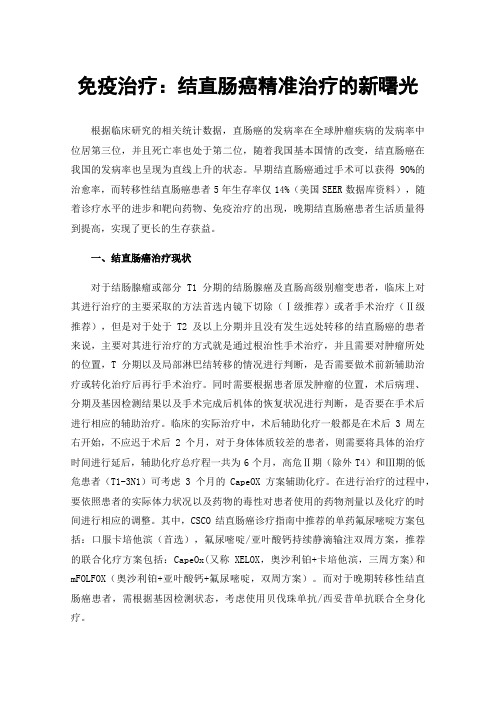
免疫治疗:结直肠癌精准治疗的新曙光根据临床研究的相关统计数据,直肠癌的发病率在全球肿瘤疾病的发病率中位居第三位,并且死亡率也处于第二位,随着我国基本国情的改变,结直肠癌在我国的发病率也呈现为直线上升的状态。
早期结直肠癌通过手术可以获得90%的治愈率,而转移性结直肠癌患者5年生存率仅14%(美国SEER数据库资料),随着诊疗水平的进步和靶向药物、免疫治疗的出现,晚期结直肠癌患者生活质量得到提高,实现了更长的生存获益。
一、结直肠癌治疗现状对于结肠腺瘤或部分T1分期的结肠腺癌及直肠高级别瘤变患者,临床上对其进行治疗的主要采取的方法首选内镜下切除(Ⅰ级推荐)或者手术治疗(Ⅱ级推荐),但是对于处于T2及以上分期并且没有发生远处转移的结直肠癌的患者来说,主要对其进行治疗的方式就是通过根治性手术治疗,并且需要对肿瘤所处的位置,T分期以及局部淋巴结转移的情况进行判断,是否需要做术前新辅助治疗或转化治疗后再行手术治疗。
同时需要根据患者原发肿瘤的位置,术后病理、分期及基因检测结果以及手术完成后机体的恢复状况进行判断,是否要在手术后进行相应的辅助治疗。
临床的实际治疗中,术后辅助化疗一般都是在术后3周左右开始,不应迟于术后2个月,对于身体体质较差的患者,则需要将具体的治疗时间进行延后,辅助化疗总疗程一共为6个月,高危Ⅱ期(除外T4)和Ⅲ期的低危患者(T1-3N1)可考虑3个月的CapeOX方案辅助化疗。
在进行治疗的过程中,要依照患者的实际体力状况以及药物的毒性对患者使用的药物剂量以及化疗的时间进行相应的调整。
其中,CSCO结直肠癌诊疗指南中推荐的单药氟尿嘧啶方案包括:口服卡培他滨(首选),氟尿嘧啶/亚叶酸钙持续静滴输注双周方案,推荐的联合化疗方案包括:CapeOx(又称XELOX,奥沙利铂+卡培他滨,三周方案)和mFOLFOX(奥沙利铂+亚叶酸钙+氟尿嘧啶,双周方案)。
而对于晚期转移性结直肠癌患者,需根据基因检测状态,考虑使用贝伐珠单抗/西妥昔单抗联合全身化疗。
肠癌(新)辅助化疗进展

60 T2-T3 Capecitabine
pCR% 19 34 29 25 37 28.3
1 Rodel C, et al. Journal of Clinical Oncology. 2003; 21: 3098-3104. 2 Valentini V, et al. Proc Am Soc Clin Oncol. 2002;21: 151A. 3 Aschele C, et al. Proc Am Soc Clin Oncol. 2002; 21: 132A. 4 Mitchel EP, et al. Proc Am Soc Clin Oncol. 2003; 22: 262A,.
Yu BM, et al. Chinese Journal of Practical Surgery. 2005;25(5):270-2
结肠癌的辅助治疗
静脉推注5-FU/LV曾经是III期 结肠癌的标准辅助治疗
DFS (%)
OS (%)
Study
Regimens
Patients 5-FU/LV Control 5-FU/LV Control
5'-DFCR CyD
5'-DFUR
5'-DFUR 胸苷磷酸化酶 (TP)
5-FU
5'-DFCR = 5’-脱氧-5-氟胞嘧啶核苷; 5'-DFUR = 5-脱氧-5氟嘧啶; CyD =胞嘧啶脱氨酶; CE =羧酸脂酶
卡培他滨治疗结直肠癌理论基础
卡培他滨是口服, 肿瘤内激活的氟尿嘧啶氨基甲酸酯 1 卡培他滨已经成为晚期结直肠癌的一线治疗药物 NCCN指南推荐卡培他滨为结直肠癌单药一线治疗药物 10例患者中有9例更愿意口服治疗2 门诊患者口服化疗,方便患者过正常的生活 卡培他滨一线治疗较5-FU/LV静脉给药治疗反应更好,安
中国临床肿瘤学会 (CSCO)结直肠癌诊疗指南2020版

无症状健康人群的筛查:高危人群 (III 级专家推荐)
高危 人群
非进展期腺瘤
2-3年复查 结肠镜
复发 未复发
继续 2-3年复查结肠镜
延长间隔至3-5年
结直肠癌的筛查及遗传学
• 无症状健康人群的结直肠癌筛查
见指南第2.1节
• 遗传性结直肠癌筛检和基因诊断原则
见指南第5节
1/3 的大肠癌具有遗传背景
Familial CRC:
≥1位一级或二级 亲属患大肠癌
Lynch HT, et al. 2013
遗传性结直肠癌指南总体框架
遗传性结直肠癌主要包括:
• Lynch综合症 • FAP (家族性腺瘤性息肉病)
典型的FAP
结直肠内息肉数均在100枚以上,癌变 年龄早,癌变风险几乎为100%
AFAP (轻症FAP)
虽然缺乏循证医学证 据,但是专家组具有 一致共识的
良好的大型回顾性研究、病 得共识,而且存在较大争议(支
例-对照研究,专家组取得 持意见<60%)
基本一致共识,但有小的争
议(支持意见60%~80%)
结直肠癌的MDT诊治原则
—— MDT基本概念
核心:以病人为中心,以专家组为依托
来自两个以上不同学科的一组相对固定的专家 在固定的时间、固定的地方聚在一起
• FAP患者会出现先天性视网膜色素上皮肥大(CHRPE),在典型的FAP中发生率可达80%。 • 1/3-1/4的FAP患者无家族遗传史,为该个体胚系新发肿瘤。家族史并不是诊断FAP的必要条件。
FAP筛检——II 级专家推荐
结直肠癌 患者
息肉 (≥20枚)
关注家族史
(+) 强烈建议
体格检查
结直肠癌黏液腺癌临床病理及治疗进展2024(全文)

结直肠癌黏液腺癌临床病理及治疗进展2024(全文)结直肠癌(colorectal cancer,CRC)是全球范围内的一种常见恶性肿瘤,流行病学数据表明全球CRC总体发病率已经升至第三位,也是癌症相关死亡的第二大原因[1]。
在CRC中,黏液腺癌(mucinous carcinoma,MC)是非特异性腺癌(adenocarcinoma not otherwise specified,AC)中一个独特的组织亚型,其特点是细胞外黏液占肿瘤体积50%以上。
一、黏液腺癌临床病理特征统计数据表明,MC发病率具备一定地域差异,MC的发病率从亚洲国家的3.9%到欧美国家的10%~13.6%不等[2]。
通过对发病部位的研究发现,MC在近端结肠的发病率显著高于直肠或远端结肠。
针对相同部位肿瘤进行分层分析后发现,MC常发现于疾病进展期[3]。
对这一现象有两种假说。
其一可能与MC中黏液蛋白物理特性相关,MC中黏液蛋白基因MUC2的过度表达和抑癌基因转录因子HATH1沉默密切相关,与AC中的表达趋势相反[4]。
染色体不稳定可能是MC疾病快速进展的另一种机制,相对于AC,MC出现微卫星不稳定性(microsatellite instability,MSI)频率更高。
高MSI发生率在Lynch综合征患者中也可以观察到,这表明MC与AC可能具备不同的致癌途径[5]。
MC与AC的转移模式存在明显差异,AC常见远处转移器官为肝脏,而MC更容易出现腹膜转移,且MC术后淋巴结阳性率高于AC。
转移模式差异的原因目前认为与黏液组分密切相关[6]。
正常黏液与肠道微生物构成了菌群生物膜。
MC中菌群生物膜的失调导致肠道上皮通透性增强,黏液组分会由肠道向腹腔内移动,导致肿瘤的腹膜转移及对邻近脏器侵犯[7]。
另外,菌群生物膜将诱导肠道炎症反应。
炎症反应导致大量细胞因子的产生,如TNF-α、IL-22,研究表明此类细胞因子促进肿瘤细胞的黏液分泌。
例如,TNF-α处理的结肠癌细胞ATOH1蛋白的稳定性增强,进而促进黏液分泌。
2024年ASCO-GU研究进展课件

TFE3重排肾癌研究
01. TFE3重排肾癌的治疗挑战 TFE3基因重排肾癌治疗难度大,需更多研究。
02. 不同融合伴侣基因的疗效差
异ASPSCR1-TFE3融合型对联合治疗响应好。
03. MED15-TFE3融合肾癌特点
MED15-TFE3融合肾癌生物学行为相对温和。
个体化治疗策略
病理亚型与治疗
03
乳头状癌免疫微环境特征
T细胞和M2型巨噬细胞数量低 于透明细胞癌。
嫌色细胞癌免疫应答
嫌色细胞癌对免疫治疗反应 嫌差色细胞癌几乎不响应免疫治疗。
1
免疫“冷”肿瘤特性 单细胞测序技术揭示嫌色细胞癌免疫“冷”肿瘤特征。
2
改善嫌色细胞癌免疫应答策 略需克服障碍将“冷”肿瘤转化为“热”肿瘤以提升治疗效果。
03 未来需更多基于驱动基因 分型治疗的临床研究。
单细胞测序技术
单细胞测序揭示嫌色细胞癌 免疫“冷”肿瘤特性 单细胞数据分析显示嫌色 细胞癌T细胞克隆扩增低 ,免疫治疗反应不佳。
单细胞测序技术在肾细胞癌 研究中的应用 通过单细胞测序探究不同 肾细胞癌亚型的免疫微环 境差异及治疗响应。
个体化治疗策略的制定依据
2024年ASCO-GU研究进展
目录 CONTENTS
01 非透明细胞肾癌新疗法 02 肿瘤微环境特征分析
03 个体化治疗策略 04 未来研究方向展望
非透明细胞肾癌新疗法
药物治疗更新
靶免联合治疗新进展
01
KEYNOTE-B61研究显示帕博利 珠单抗联合仑伐替尼在晚期 nccRCC中疗效和安全性良好 。
01
乳头状癌的药物治疗
乳头状癌可能从靶免联合治 疗中获益。
02
嫌色细胞癌的治疗选择 嫌色细胞癌对免疫治疗响应 不佳,需个体化治疗。
卡培他滨希罗达在进展期结直肠癌中的治疗进

二项欧/美III期国际开放RT: n=1207 方案: Xeloda: 12502×14/21d vs Mayo: LV 20→bolus 5-FU 425, d l–5/28d 疗效:
转移 肝 26 17 肺 33 10 单个 38 24 多个 22 15 MTTP(mo) 4.6 4.7 MOS(mo) 12.9 12.8
Xeloda 可在联合化疗中取代5FU/LV
静脉推注 5FU/LV并不合理 静脉滴注 5FU/LV 较好, 但 不方便,不舒适 费时 CVA并发症 Xeloda 模拟连续静脉滴注5-FU 与Oxa or Iri联合有理论基础
一. 希罗达®联合奥沙利铂治疗进展期结直肠癌
奥沙利铂可上调结直肠异种肿瘤移植瘤内TP活性
感觉 恶心/ 腹泻 疲乏/ 手足 神经性 口炎 神经病变 呕吐 无力 综合征 疼痛
½级 ¾级
病例 (%)
生存情况和随访
最后一例病人入选后7个月以及试验开始后15个月, 尚未到中位生存期 22 例病人仍在接受试验性治疗 34 例病人疾病尚未有进展 2003ASCO公布最新结果:中位生存期 19.5月;中位无疾病进展生存期 7.6月;稳定>3月 31%
Sawada N et al. Eur J Cancer 2003;1(Suppl. 5):S93 (Abst 303)
*
*
*
XELOX在人结直肠癌移植瘤模型上具有协同作用
对照 卡培他滨 (2/3 MTD) 奥沙利铂 (2/3 MTD) 卡培他滨+奥沙利铂 ( 2/3 MTD)
10 5 1 0.5 0.1
安全性好:5FU常见S/E↓; FNP&Sepsis↓; S/E住院少;S/E减量少
2023版CSCO结直肠癌诊疗指南更新解读(早期疾病部分)

2023版CSCO指南:MRD获更多关注
首个基于ctDNA (MRD)指导下的II期结肠癌术后辅助化疗研究
Adjuvant Treatment Delivery
Recurrence-Free Survival
MRD领域面临的临床困境及前景
MRD领域面临的临床困境及前景
近期有硏究显示,动态ctDNA监测有助于提前预警木后复发转移,但其是否应该被常规用于 术后随访并指导治疗仍存在争议,[2] REINERT T, HENRIKSEN TV, CHRISTENSEN E, et aL Analysis of plasma cel I-free DNA by ultradeep sequencing in pattents with stages ! to III colorectal cancer. JAMA Oncology, 2019, 5 (8) :1124-1131.[3] TIE J, COHEN JD, WANG Y, et al. Circulating Tumor DNA Analyses as Markers of Recurrence Risk and Benefit of Adjuvant Therapy for Stage 1H Colon Cancer. JAMA Oncol', 2019, 5:1710-1717,[4] CHEN G, PENG J, XIAO Q, et aL Postoperative circulating tumor DNA as markers of recurrence risk in stages II to III colorectal cancer. J Hematol Oncol, 2021 r 14: 80.
西妥昔单抗和贝伐单抗在晚期结直肠癌一二线治疗中的研究进展
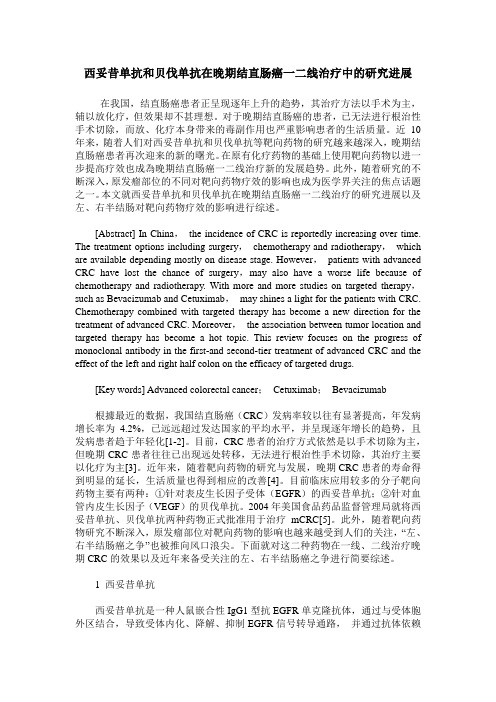
西妥昔单抗和贝伐单抗在晚期结直肠癌一二线治疗中的研究进展在我国,结直肠癌患者正呈现逐年上升的趋势,其治疗方法以手术为主,辅以放化疗,但效果却不甚理想。
对于晚期结直肠癌的患者,已无法进行根治性手术切除,而放、化疗本身带来的毒副作用也严重影响患者的生活质量。
近10年来,随着人们对西妥昔单抗和贝伐单抗等靶向药物的研究越来越深入,晚期结直肠癌患者再次迎来的新的曙光。
在原有化疗药物的基础上使用靶向药物以进一步提高疗效也成為晚期结直肠癌一二线治疗新的发展趋势。
此外,随着研究的不断深入,原发瘤部位的不同对靶向药物疗效的影响也成为医学界关注的焦点话题之一。
本文就西妥昔单抗和贝伐单抗在晚期结直肠癌一二线治疗的研究进展以及左、右半结肠对靶向药物疗效的影响进行综述。
[Abstract] In China,the incidence of CRC is reportedly increasing over time. The treatment options including surgery,chemotherapy and radiotherapy,which are available depending mostly on disease stage. However,patients with advanced CRC have lost the chance of surgery,may also have a worse life because of chemotherapy and radiotherapy. With more and more studies on targeted therapy,such as Bevacizumab and Cetuximab,may shines a light for the patients with CRC. Chemotherapy combined with targeted therapy has become a new direction for the treatment of advanced CRC. Moreover,the association between tumor location and targeted therapy has become a hot topic. This review focuses on the progress of monoclonal antibody in the first-and second-tier treatment of advanced CRC and the effect of the left and right half colon on the efficacy of targeted drugs.[Key words] Advanced colorectal cancer;Cetuximab;Bevacizumab根據最近的数据,我国结直肠癌(CRC)发病率较以往有显著提高,年发病增长率为4.2%,已远远超过发达国家的平均水平,并呈现逐年增长的趋势,且发病患者趋于年轻化[1-2]。
结直肠癌的免疫治疗进展
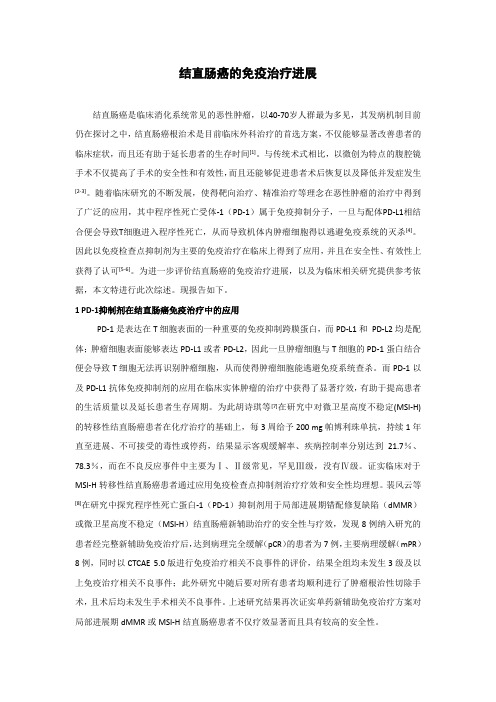
结直肠癌的免疫治疗进展结直肠癌是临床消化系统常见的恶性肿瘤,以40-70岁人群最为多见,其发病机制目前仍在探讨之中,结直肠癌根治术是目前临床外科治疗的首选方案,不仅能够显著改善患者的临床症状,而且还有助于延长患者的生存时间[1]。
与传统术式相比,以微创为特点的腹腔镜手术不仅提高了手术的安全性和有效性,而且还能够促进患者术后恢复以及降低并发症发生[2-3]。
随着临床研究的不断发展,使得靶向治疗、精准治疗等理念在恶性肿瘤的治疗中得到了广泛的应用,其中程序性死亡受体-1(PD-1)属于免疫抑制分子,一旦与配体PD-L1相结合便会导致T细胞进入程序性死亡,从而导致机体内肿瘤细胞得以逃避免疫系统的灭杀[4]。
因此以免疫检查点抑制剂为主要的免疫治疗在临床上得到了应用,并且在安全性、有效性上获得了认可[5-6]。
为进一步评价结直肠癌的免疫治疗进展,以及为临床相关研究提供参考依据,本文特进行此次综述。
现报告如下。
1 PD-1抑制剂在结直肠癌免疫治疗中的应用PD-1是表达在T细胞表面的一种重要的免疫抑制跨膜蛋白,而PD-L1和PD-L2均是配体;肿瘤细胞表面能够表达PD-L1或者PD-L2,因此一旦肿瘤细胞与T细胞的PD-1蛋白结合便会导致T细胞无法再识别肿瘤细胞,从而使得肿瘤细胞能逃避免疫系统查杀。
而PD-1以及PD-L1抗体免疫抑制剂的应用在临床实体肿瘤的治疗中获得了显著疗效,有助于提高患者的生活质量以及延长患者生存周期。
为此胡诗琪等[7]在研究中对微卫星高度不稳定(MSI-H)的转移性结直肠癌患者在化疗治疗的基础上,每3周给予200 mg帕博利珠单抗,持续1年直至进展、不可接受的毒性或停药,结果显示客观缓解率、疾病控制率分别达到21.7%、78.3%,而在不良反应事件中主要为Ⅰ、Ⅱ级常见,罕见Ⅲ级,没有Ⅳ级。
证实临床对于MSI-H转移性结直肠癌患者通过应用免疫检查点抑制剂治疗疗效和安全性均理想。
裴风云等[8]在研究中探究程序性死亡蛋白-1(PD-1)抑制剂用于局部进展期错配修复缺陷(dMMR)或微卫星高度不稳定(MSI-H)结直肠癌新辅助治疗的安全性与疗效,发现8例纳入研究的患者经完整新辅助免疫治疗后,达到病理完全缓解(pCR)的患者为7例,主要病理缓解(mPR)8例,同时以CTCAE 5.0版进行免疫治疗相关不良事件的评价,结果全组均未发生3级及以上免疫治疗相关不良事件;此外研究中随后要对所有患者均顺利进行了肿瘤根治性切除手术,且术后均未发生手术相关不良事件。
2015ASCO早期肠癌进展
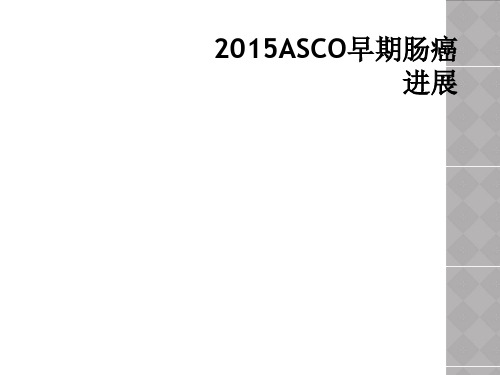
2021/1/5
21
研究背景
• KRAS
– KRAS突变在mCRC被证实为预测EGFR抑制剂耐 药的指标
– 但对切除后的、无转移的CRC的预测价值不明
• BRAF
– mCRC的重要预后指标之一 – BRAF V600E突变与切除后的、无转移的CRC的
不良预后是否相关仍有争议
Julien T2a0ie2b1./.1A/5SCO 2015 Oral Abstract #3507
2/3
BRAF突变 ≈50%
散发型病例
MLH1后生失活 (MLH1启动子甲基化)
微卫星不稳定(MSI) dMMR
1/3
无BRAF V600E突变
家族型病例 Lynch综合征 胚系突变:MLH1,MSH2等
Aziz Z.2A0S2C1O/210/155 Oral Abstract #3506
9
MSI-H对III期结肠癌的影响
2021/1/5
39
中国FOWARC研究---mFOLFOX6加或不加放疗术前新辅 助治疗局部进展期直肠癌的多中心随机对照研究
2021/1/5
Wang J, et al. ASCO 2015 (Abstrat 3500)
在1年后获得改善,提示目前的生活质量评估工具可 能无法对毒性相关的不良状态进行全面有效的捕捉
如何在更好的疗效、更好的生活质量和健康状态之间获 得平衡,仍需等待SCOT研究的生存数据更新!
Timoth2y0I2, e1t/1al/.5ASCO 2015 (Abstrat 3514).
38
2015 ASCO辅助治疗热点及进展 2015 ASCO新辅助治疗热点及进展
34
2015 ASCO CRC辅助治疗热点及进展
- 1、下载文档前请自行甄别文档内容的完整性,平台不提供额外的编辑、内容补充、找答案等附加服务。
- 2、"仅部分预览"的文档,不可在线预览部分如存在完整性等问题,可反馈申请退款(可完整预览的文档不适用该条件!)。
- 3、如文档侵犯您的权益,请联系客服反馈,我们会尽快为您处理(人工客服工作时间:9:00-18:30)。
To investigate the incidence of MSI-H in stage II (n=395) and stage III (n=859) COC, its association with histopathological variables and its prognostic and predictive impact 。
2
分子指标预测结肠癌高危复发及指导化疗 Abr4000 高通量 Abr4001MSI Abr 4002 Abr 4012 18q LOH
3
Background: NSABP C-01/C-02 、CCF 、 C-04 、C-06 48 genes significantly associated with recurrence risk and 66 genes predictive of 5FU/LV benefit . Multivariate analysis yielded 18 genes (7 prognostic genes, 6 predictive genes, 5 reference genes) and separate prognostic recurrence score (RS) and predictive treatment score (TS) algorithms.
Results: In the QUASAR validation study the RS predicted recurrence risk (p=0.004). The RS also predicted DFS (p=0.01) and OS (p=0.04). Recurrence risk increased monotonically with increasing RS. In multivariate analyses, RS retained prognostic significance (p=0.008) independent of mismatch repair (MMR), T stage, nodes examined, grade, and lymphovascular invasion. MMR deficiency (p<0.001) and T4 stage (p=0.005). However, TS was not validated as a predictor of 5FU/LV benefit
Methods: Gene expression was quantitated by RT-PCR . Recurrence-free interval (RFI), disease-free survival (DFS), and overall survival (OS) were analyzed using Cox regression
1564Patients:PETACC 3-EORTC 40993-SAKK 60/00 trial P53, SMAD4, thymidylate synthetase (TS) and hTERT, mutations of KRAS and
BRAF, microsatellite instability (MSI) and 18qLOH Results
2009ASCO结肠癌进展
南昌大学第一附属医院肿瘤科 黎军和
1
分子指标预测Ⅱ期结肠癌高危复发 大型研究结果 Ceteximab疗效的预测 结肠癌辅助化疗终点 Oxaliplatin相关 synchronous stage IV colorectal cancer 化疗策略和方案的调整 其它
Conclusions:RS is a validated, independent predictor of individualized recurrence risk for stage II colon cancer
Kerr etl. 2009 ASCO Abstract No:4000 4
Conclusions: Molecular markers in colon cancer have a stage specific prognostic value. The possibility that the stages represent different diseases, rather than sequential steps in the evolution of a single disease, needs to be considered.
Tejpar etl. 2009ASCO Abstract No:4001 5
Object:To compare the incidence of molecular markers in stage II (SII) and III (SIII) colon cancer and tested their prognostic value per stage
Patients:PETACC 3-EORTC 40993-SAKK 60/00 trial Results:MSI H was present in 22% (85) of Stage II and 12%
(103)of Stage III colon cancer.Microsatellite stability is a strong prognostic factor for RFS and OS when considering Stage II and Stage III COC. Subgroup analysis suggests a stronger effect in Stage II than in Stage III. There is no evidence for an effect of the addition of IRI.
